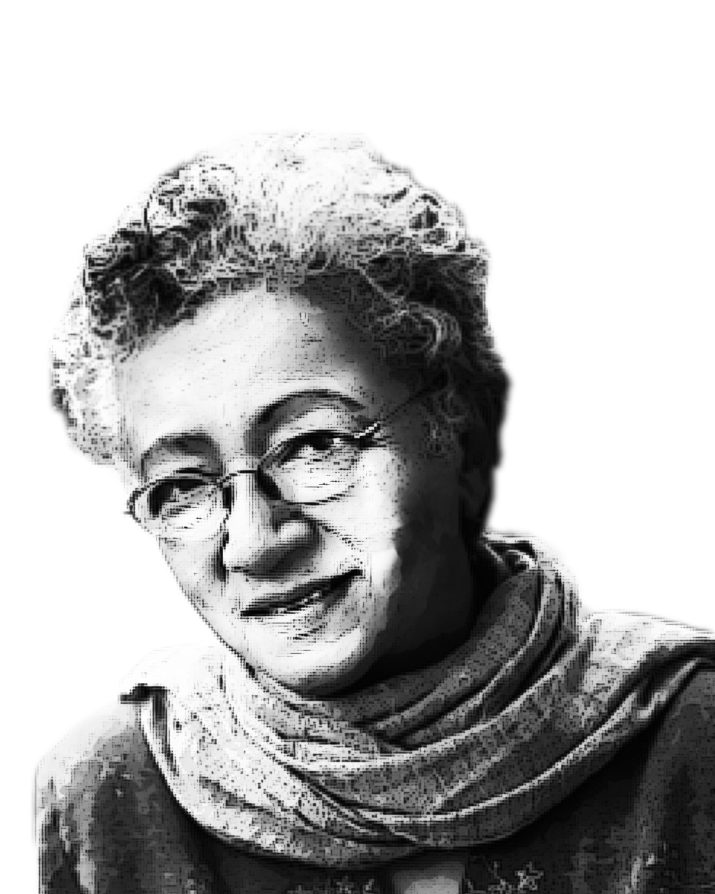


Translated from the French by Allison M. Charette
This is part of our special feature, Beyond Eurafrica: Encounters in a Globalized World.
You cannot walk fast in Antananarivo. There’s a weight in the air, a heat that makes everything slow and viscous. There’s a constant smell of noxious gas, an acid odor that gets into your lungs, infests your muscles. There’s the red dust, blackened by exhaust fumes, and the perpetual suffocation of the city, so precariously perched, so dry.
You get smothered in Tana, when it’s hot.
But it’s not always hot. Not always dry. There’s also the rainy season, every year: cyclones, floods, washed-out roads, crumbling houses that collapse onto themselves, like a pile of mud reborn under the water, running everywhere, penetrating everywhere, racing toward long-blocked egresses.
You suffocate in Tana, in the sticky water vapor rising from the parched ground, unable to contain the thousands of liters of water that pour out in a few months, leaving the earth even more arid than before, carrying the humus toward the Betsiboka River and the sea over in Mahajanga—red, so very red, from having ripped the flesh from the scorched earth over decades and decades, a scarlet sea, crimson, thick, equally heavy, like a woman pregnant with a stillborn child.
You cannot walk fast in Antananarivo; the stench of the air forces a body to inertia. And yet Naivo is almost running, he runs through a sun exploding color, shimmering light, diffracting nuances and forms, melting everything into a strange halo that contorts perspective. It’s not the rainy season. Not yet. Fortunately. The air shimmers and colors the sky blue, a blue to pierce through the layer of exhaust fumes.
It seems to Naivo that he’s been running for hours. He is smothered, he suffocates, his heart pounds like a drum, the wet heat is unbearable.
At least we don’t have cholera, he thinks. Or mud, or stagnant water, or sewage, at least, not yet.
Thirty. Naivo, he’s thirty years old, thirty years of hell, a thin body, skinny, not very tall, already slightly stooped, his face resigned. Five years ago, he was still happy, laughing. Now, he’s tired, drained of enthusiasm. The riots stretching back to his youth, then unemployment, watching other people getting rich quick, very quick . . .
It’s the in-between season, just before the rain, the air is starting to get humid, and it’s sweaty, sticky, the birds aren’t singing. But are there really any birds in this city, a city choked by cars? Everything seems broken in Antananarivo, everything. And everyone feels like there’s no point in moving in this heat. They should have made artificial rain, it’s already two months late, water is scarce, hills are burning all around the city and pretty much everywhere on the island. The farmers are scared. They say it’s bad, very bad, the earth is too dry, the seeds are parched and will die out in the ground, perish in the floods, because the dry ground will just flood when the rain comes, the earth won’t be able to contain the water. But they keep burning the earth, burning it without end.
The harvest is lost. But what can you do? There’s the sun, the heat, the late rain, the twenty predicted cyclones, and they’re all used to misfortune.
Misfortune, Naivo, he feels it now, deep down, in this moment, in this city, Antananarivo, and up on the hill where the spirits blow. Ambohitsaina, the hill that houses the university where there are supposed to be students. The hill where he lives and studies. Studies what, though? And for what future?
Forgotten by God, destiny, the city, society: five per barrack room, three thousand in each lecture hall, their only prospects the little odd jobs in the non-taxed zones that only pay four hundred francs a month, six hundred with extra hours, at any rate less than projected, and now AIDS. AIDS, so far away from the bitch of a city and the dignified cosmopolitans who don’t even know they exist: they, the students from every province on the island, shut up there, sent for God only knows what kind of future, if God exists, a thousand kilometers from home, by their starving parents who don’t know what to do to get money to their kids anymore, because the students need money, there aren’t any little odd jobs in big cities, or rather, that’s all there is, odd jobs, that never pay. The earth doesn’t produce anything anymore, it’s difficult to buy food, Antananarivo is expensive. On campus, five or six people share twenty square meters—a space that is generously allocated to them by the university—with a piece of fabric or cardboard to separate the beds. Twenty square meters to talk, dream, make out, smell everybody’s stinky feet, hang dirty laundry, and cook rice with maybe some bits of meat. Twenty square meters.
They live together there, banding together by region, united by the same hatred and violence, thrown into slums where some of them wouldn’t even let their dogs live, but where they’re supposed to live, work, and make a future, there on the hill where the university campus sits. Thanks Papa President, thanks society, thanks everyone.
Every so often, there’s a scrape. They have to vent, get something off their bursting chests. Whenever that happens, officials turn up, talk about ethnic wars, thugs, getting the university cleaned up.
A bit of sweeping up, some show, and then everything goes back to normal: normal stench, normal crap.
Nausea. Naivo feels it invading him, taking over, welling up, flooding him. Deep nausea, a rotten taste in his mouth, thick nausea, sticky, all the noxious fumes around him, he wants to heave his guts out, his life, just vomit. It’s a want he can’t quite get rid of, the unease, the horror of waking up on the hill of ghosts every dawn.
Naivo, he’s thirty, almost how old Christ was, the idea of sacrifice, or maybe more of devotion. You usually get smothered in Tana, when you’re thirty.
Malala a, ahoana intsony no fomba itiavako anao.
A song comes to him from somewhere deep in his bowels, like a woman’s voice singing, a flute sound, light, thin, more imagined than heard. A song picked up by the radio to get it stuck in your head, defying description. Malala an . . .
For a moment, he closes his eyes, leaning against a wall to hear it better, to remove himself from this city, its cars, its smells, its chaos, and just follow that song, start singing it himself, music, a child like before, in his village, where they whittled bamboo to make flutes.
Ahoana no fomba itiavako anao, how can I still love you?
The phrase spins in his head, an obsessive refrain. Love, it seems . . . Yeah right. Love and all of that, just to end up like his friend Rivo, with crazed eyes, defecating in his bed, unable to do anything about it. Love . . . What could that ever mean on your way to hell, no present, haunted by hunger and poverty. What good is it anyway, all those little tunes, now that these illnesses have started popping up, AIDS or whatever else.
AIDS: the word has been taboo, ignored, masked, for a long time. People would talk about diarrhea, “a terrible illness”. No one dared to utter the truth: Rivo has AIDS. Late-stage, they diagnosed it too late, but who cares? They’ve known for a while, Rivo was isolated, the whole medical staff was avoiding him.
Naivo walks, walks through the city, still so beautiful, but drooping, as if it, too, is sagging under the weight of its population’s extreme poverty.
Naivo, he’s walked the whole day, pushing his muscles and legs, which would rather slow down. But if he slows down, he’ll start thinking again, and he doesn’t want to think anymore, why would he, what would he try to face? Rivo’s been hospitalized for a month, but he’d been wandering the campus without treatment for the past year, taking whatever pills he could buy or find here and there. With seventy French francs to live on per month, what else could he do? Nothing, actually: doctors cost money, the hospital costs money, everything costs money, alcohol, cotton, mattresses, the care itself, they talk about reimbursement, the State has to reimburse the fees, and leave those who can’t pay to perish in peace, or at least to not set foot in the hospital again. So these fine people, these intelligent people, the ones who determine the future of the world, talking about the idiocy of all these Malagasies who don’t want to get themselves treatment, they organize conferences to present papers on undetermined cultural factors, the Malagasy suspicion of illness, asking Europeans for money to organize the conferences, divvying up the profits among themselves, because running conferences is complicated, and everything is fine: sick people stay in their own homes, under their parents’ care, without going to a hospital, that’s perfect, because it makes it so the statistics aren’t too horrifying, tourists will come, be perfectly satisfied, the World Bank hands out their gold stars, aid comes in, so why complain?
“Pretty boy, pretty face,” they called Rivo. It’s true, Rivo was good looking, not so long ago, a few months ago. But now, Rivo’s losing his guts, Rivo is emaciated, he stinks, Rivo is unbearable, Rivo is death.
It’d been horrific when he’d started having the runs, regularly, leaking all over the place, in the bathroom, on the ground, on the mattress, everywhere. He couldn’t even get up anymore, bathed in his own excrement, going on himself, his decrepit muscles . . .
But the toilets were blocked anyway, and dirty and humid and sticky, their stench getting everywhere, overwhelming everything, even reaching the bedrooms and courtyards and buildings, a stench of shit that reigned over the slums someone had pompously named university residences. Residences, yeah. Inside, they die en masse, in pens separated by pieces of cardboard, teeth chattering in the winter, suffocating in the rainy season, crapping in basins beneath a dripping ceiling, because the ceiling dripped, the architects hadn’t thought of anything better than making the roof flat, there on the hill in the Hauts Plateaux, Ambohitsaina Hill, a hill where spirits blow, the hill where the slightest drizzle would spill into staircases, hillsides, and ravines. So, flat roofs, huh?
Malala o . . .
Gloomy, he goes to sit down on the sidewalk, where he waits, the tailpipes of cars brushing against him. Whatever’s happening, he’ll have to stop for a bit, actually stop and rest. In an approaching death, there is a moment where everything waits, suspended. And here it is. This is definitely it. Both in Rivo and in him. First, Naivo had felt the classic panic, then the calm that he understood illness to involve, the final separation. His first reflex was to think that he should notify Rivo’s family, send him back home to his village, but the illness had the upper hand, it progressed very quickly, leaving them without energy, exhausted. The rhythm of their lives was set by coughs, wounds that didn’t heal, herpes that broke out everywhere on the thinning body, and then there was the diarrhea, it almost crushed everyone. Naivo now feels an awful hole within himself, part of him ripped out that will leave with the other one, the one who has fallen ill, the one on the edge of the abyss, am-bavahoana, like his friends say. There is now, within himself, definitely, a lack of any power.
And without Saroy, they would have left him there, Rivo in his room on the hill, locked up tight in the dark, and they would have brought him something to eat from time to time, from a distance, because you can catch AIDS. But Saroy made a fuss, decided that leaving him there was out of the question, that they had to take him to the hospital, she handled everything, paid for it all.
And now, he’s in a private room, pretty boy Rivo, AIDS had shot him down mid-flight, mid-heart, mid-sex. It’s done, the pretty boy, just a skeleton body now, a piercing gaze, eyes devouring the face, or whatever’s left.
Got AIDS, tsy misy fanafana, no escape. There’s nothing left to do, except notify his family back home, his mother in Fianarantsoa, the most prudish city on the island, the city with a thousand churches: tell his pastor father, his mother, the one Rivo never talks about, except for once, when he was drunk, completely plastered, and he said, “I’ll never look at her again.”
His mother would have to be told . . . As it was, it had been three years since he’d shared any news with her, since she’d given him any news about her. But no one was going to say anything to his mother—what’s the point, he’s going to die, everyone’s going to die, from AIDS or something else! They’ll try to return the body to his homeland, or maybe notify his family in time for them to come do it themselves.
On the hill, they stayed silent, no one said any more about it. What could they say? What could they do? The girls were shut up more tightly. They valued their girls there, wouldn’t let them catch anything, no matter what. It was said that AIDS was transmitted through sex, but also through blood, and that’s what women are, sex and blood, and how do you put on a condom, wrap it up, when making love to a woman you love, a woman you’d like to marry and have kids with? You have to wrap them up, shelter them from any desire to look elsewhere, they have to be protected, you have to protect yourself. Speaking of, where do they throw out their period pads? Sometimes, he sees rag squares hanging to dry . . .
They were shut away high up on the hill, shut away by ethnicity or region. They got used to the hill of ghosts, they survived there, adapting any way they could, especially the ways that were least morally tolerated.
Tourists were Rivo’s specialty. First women, then one day he’d discovered men. Rivo, he loved men, and they loved him too, with his tight pants, low-cut tank, earring, and leather bracelet. Rivo went to clubs every night. Apparently a singer.
He sang the blues every night in a hip club near the market, or near the parking lot, and doing that, he didn’t have to come home every night, he’d come back later smelling nice, humming something, with imported cigarettes and money and a swagger.
Pretty boy, pretty face. He made fun of everything, he said, mostly himself. Made fun of this city that had shut him out. Antananarivo had been beautiful, with its brick houses that now swarm the hills, its market that’s now just a parking lot, its parks that are trying to come back to life. Antananarivo, it was beautiful, but its houses are crumbling, its dykes cracking, its sewers overflowing, its stench rising, and nausea, too, nausea at the indifference and scorn and disdain of the well-off, the rich, so rich, too rich, if that actually has any meaning, the ones whose Madagascar stops at the boundary of the city center and its hills, the ones who think that everywhere else is the realm of the nothings, the no ones, no dignity, no homes, the descendants of slaves, the coastals, the mixed-races, the foreigners, and the other tattered mobs.
Naivo, he’s nauseous. And he’s been walking through the city for hours. Perhaps he knows nothing more save that, snaking through the streets and alleyways, wandering through neighborhoods, trying to get tired, to hit some kind of fatigue that would finally let him sleep, finally sleep, sleep to the point of exhaustion and peace. Perhaps.
He wants to walk faster, but he can’t. He feels the whole weight of grief inside, and of silence, impossible to ease the load. Naivo, he’s thirty years old, people call him Naivo or something else, whatever, why not Naivo, because that’s the name given to the youngest child in the family in Madagascar: the one who is routinely exploited, the one who doesn’t have any responsibilities, or who has all of them without thanks. Naivo, always the assistant.
And everyone in his generation, they’re always the assistant, at best. Their backs are up against the wall, with no future, with firmly anchored despair as their reality and only prospect.
Rivo had been very handsome, with the nonchalance of a loping predator cat. Musician, student, looking for work, sauntering down the streets of Antananarivo. And then, one day, Antananarivo’s sadness set upon him. For the streets of Antananarivo are sad, because of the resigned men and women haunting them, because of the dark clothes they are forced to wear, overly proper dresses, bland colors. Sad because of the endless mourning.
And no one will admit that they’re all stewing in that mourning, Rivo and him and everyone, who knows now the infinite lethargy procured by the images swirling in their heads, the horrible images that accompany desires to kill, who knows the horrible feeling of being haunted by sounds and unspeakable screams. A song comes back to him that lets him slip out of himself, escape from the insanity that is becoming embedded within.
Akaikinao ry Raiko . . .
It’s a Protestant hymn that Rivo sang all the time, the son of a dumb Prod who expressed his doubts about God’s existence, who refused to conceive of the one who’d created the world—thanks for the crap, he said, that guy must have been plastered when he made me.
And Rivo laughed like a crazy child. And when Naivo listened to him and the vice squeezed too tight, he wanted to scream, run away, break things, tell him to shut up, but how could you keep Rivo from laughing? In Antananarivo, the streets are cramped, the busses packed, many cars don’t have breaks, pollution is extremely high, life is very hard for most citizens.
Today, Naivo runs and runs. Rivo is on the brink of death, it’s been a month since he was taken to the hospital, since they had to disinfect the barracks. Well, disinfect, that is to say . . . No one dares to go inside. He’s the only one who sleeps there now.
Rivo had to be evacuated when he defecated on his mattress. They finally admitted him to the hospital and isolated him, the nurses hardly ever come to see him, the staff asked the family to change him and take care of him. The family! His family is a thousand kilometers away.
Fortunately, Saroy is there, she’s outdone herself, very much so. She came with a wad of bills, a fortune that she’d stripped off of her White lover, and she’d gone to see the doctor, had a long discussion with him, explained that the best room was required for her brother, that she could pay. Saroy knows how to speak, she went to school. Rivo has a room. Saroy did, after all, park her car just in front of the head doctor’s office and get out in a suit and heels with her friend, the minister’s mistress.
Unfortunately, she couldn’t do more. And just one of the medications that could keep him going for a few more weeks costs four months’ minimum wage, while they only got half of the minimum, so why were they working so hard? One of Rivo’s friends was startled when he found out they got seventy francs per month. Malaria was treated with pills picked up here and there. And now there’s AIDS? Saroy did what she could, but now she’s limited by loving her pretentious puppy. She can’t safely give too much more, and they’re all starving now, too, up on that hill. She told them that she can’t risk losing her man, that if she talked to him about them, about AIDS, about illness, he would run away as fast as possible back to his native France, adieu for her, back to square one, and then no more help for anyone. Whereas, if she’s careful, maybe . . . And besides, she likes the guy.
A Beamer passes Naivo, it’s going to run him over, an enormous individual, fleshy, raucous, sure of himself, of his notoriety, of his ancestors.
“Another one who got out doing business . . . ”
But what good is anger? Naivo had jumped mechanically aside, instead of chucking a rock right in the mouth of the fatass driver, or at least into his windshield. Submissive instincts are so deeply engrained.
It can’t continue like this, he’d have to do some business, too. But what could he find living on the hill where the spirits blow?
Rivo tried, called himself a dancer, an actor, had hung around in nightclubs and ended up in the hospital. Maybe he should have done something else, like Haja, accepted Randria’s offer to take weapons and go down south, you know, the zebu trade, it’s great, the villages are secluded, ranchers sometimes have upward of a thousand head, the risks are minimal, the police barely armed. It gets you cash, no one’s the wiser, they’re shipped off to Réunion, South Africa, even Europe. Gotta get out, man, gotta at least look for the way out, maybe Europe, but how do you find the plane ticket, visa, admittance to some university . . .
A young man runs and runs, breathless, oppressed. Wants to scream, cry, break things, steal, kill . . .
Naivo, he’s thirty, he knows that the way to his future is stuck shut, and that his friend has AIDS. The thought overwhelms him, slowing everything, all the way down to his breath.
This nausea has been his faithful companion for years. Very faithful. It’s difficult for him to escape it. It’s ever-present, since the year he finished high school, the year of lies uncovered, of disillusion, of futile political discourse, a persistent nausea that makes him feel apathetic, slack, sometimes snide. If the whole world lies, why not him?
“Malala an . . . ” The radio has faded and now the line is becoming ironic, embedded in him.
Done. Now, talk about love! He’s been sick of those clumps of trees for months now, doing it missionary-style there, in a rush, fed up with friends who invite you to go out because you know, tonight . . . fed up with five-person rooms, hellholes of fucking in unison. He’s started feeling like his member is shriveling up, shrinking, never to expand again. Anyway, how could you do it now, at the end of the road, when you feel, you know, shit, muscles withering away, illness reaching the brain, oh the horror! He, too, like Rivo, is starting to hate women. They’re so annoying, he says, with their compulsions, their complications, their simpering smiles. I don’t like anything about them, not their body, not their vagina, not their breasts, not their smell, especially not the monthly blood that flows from them. Horrific.
He snickers saying that, but he still says it, and makes up a song: we’re all going to waste away, waste away, yes, us, forgotten by God, forgotten by all, we’re the ones everyone’s forgotten, in the mire, in the mud, left here to rot, repeating an indoctrinated chorus of the paths of progress.
Hatred, man, hatred.
And Naivo, he thinks about all of this. About the feeling of nothing overwhelming him, that seized him when he found out about the illness. The feeling of nothing, forever and always, the body, his body without substance, without emotion, just a pain that dug in deep, so deep in the abysses, in the innermost depths of himself, in that chasm, in a cry, a scream, a song.
Survive, create, recreate. Naivo, he wants to scream.
If he’d been a writer, a film director, a musician, an actor, maybe he could have shared this moment, played with silence, clenched jaws, hardened faces, endless motions with occasional cuts and harsh stops, not necessarily cries or screams, but freezing time, suspending words, then sudden accelerating movements, quick. Maybe he would have been able to comprehend every movement, every gesture, no matter how secretive. Because the most terrible mourning is the most silent, the lack of air on the edge of the void. But he’s Naivo, he’s only Naivo, a young man of thirty, unemployed in Antananarivo. He doesn’t know how to talk about that mutilation, about that part of him that’s been ripped out, about the death of a dear friend. He only knows how to suffer the mourning, without being able to show it through his clothes or the rituals—mourning, partial mourning, coming out of mourning—or another thing, Naivo, he doesn’t have anything anymore, except his rage, his despair, that makes him want to scream, that haunts him, that smothers him. A song might be born of this moment, where he’d find words for the cold invading him. It might only be a droning refrain that he’d hum, just a line, like all the ones he hears on the radio, or something else, more structured, like in stories, arias, theater, death dances, where the essential things are obsession, rhythm of the body, of memory, of constantly changing emotions, a kaleidoscope of nuances, a twitch of the face, intimate and furtive movements, unfinished gestures, endless swaying that tries to retell the story of the body that submits, the eyes that can’t see, the hands clasping, the fingers crossing, the momentum that gets tamped down.
Naivo, waiting, he is cold, very cold. He’s in an icy spell, the ice has pervaded him, forcing him toward the approach of the great silence, a silence that seems to proliferate throughout all of nature, throughout his body, which gets heavy, heavier, just to stay alive.
Michèle Rakotoson is one of the most successful and critically-acclaimed authors in Madagascar. The author of numerous prizewinning novels, short stories, and plays, she began her writing career in France for political reasons, but now publishes her work exclusively with Malagasy houses. In 2012, the Académie française awarded her the Grande Médaille de la francophonie for her body of work. Her short stories have appeared in English translation in “From Africa,” as well as the bilingual “Voices from Madagascar.” An excerpt of her novel “She, In Springtime” was published in English translation in the Serving House Books anthology, “Paris, Etc.” In addition to writing, she focuses most of her time on championing the next generation of Malagasy writers, by organizing readings, salons, and conferences in Madagascar.
Allison M. Charette translates literature from French into English. She has received an NEA Fellowship in Literary Translation and a PEN/Heim Translation Fund Grant, been selected for the Translation Lab residency at Art OMI, and been nominated for the Best of the Net. Her translation of Beyond the Rice Fields, the first novel to be translated from Madagascar, was published by Restless Books in 2017. She founded the Emerging Literary Translators’ Network in America (ELTNA.org), a networking and support group for early-career translators, and served on the board of the American Literary Translators Association as the Program Committee Chair. Allison’s other translations have appeared in the New York Times, Words Without Borders, The Other Stories, Two Lines, Epiphany, SLICE Literary Magazine, the SAND Journal, and others.
Published on March 1, 2018.




